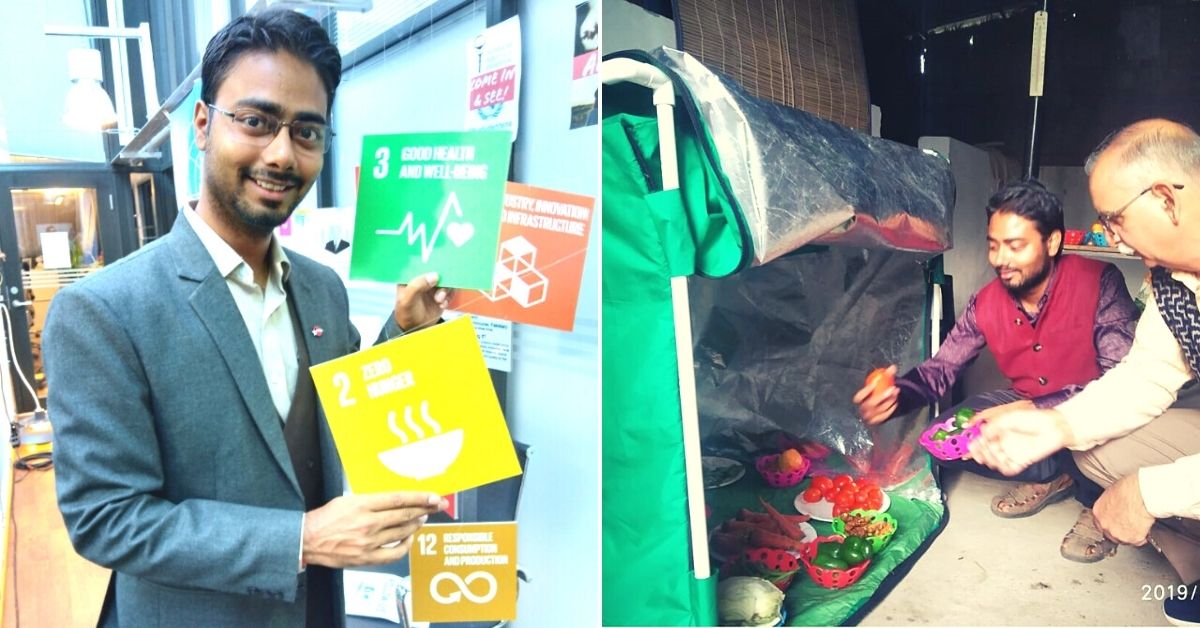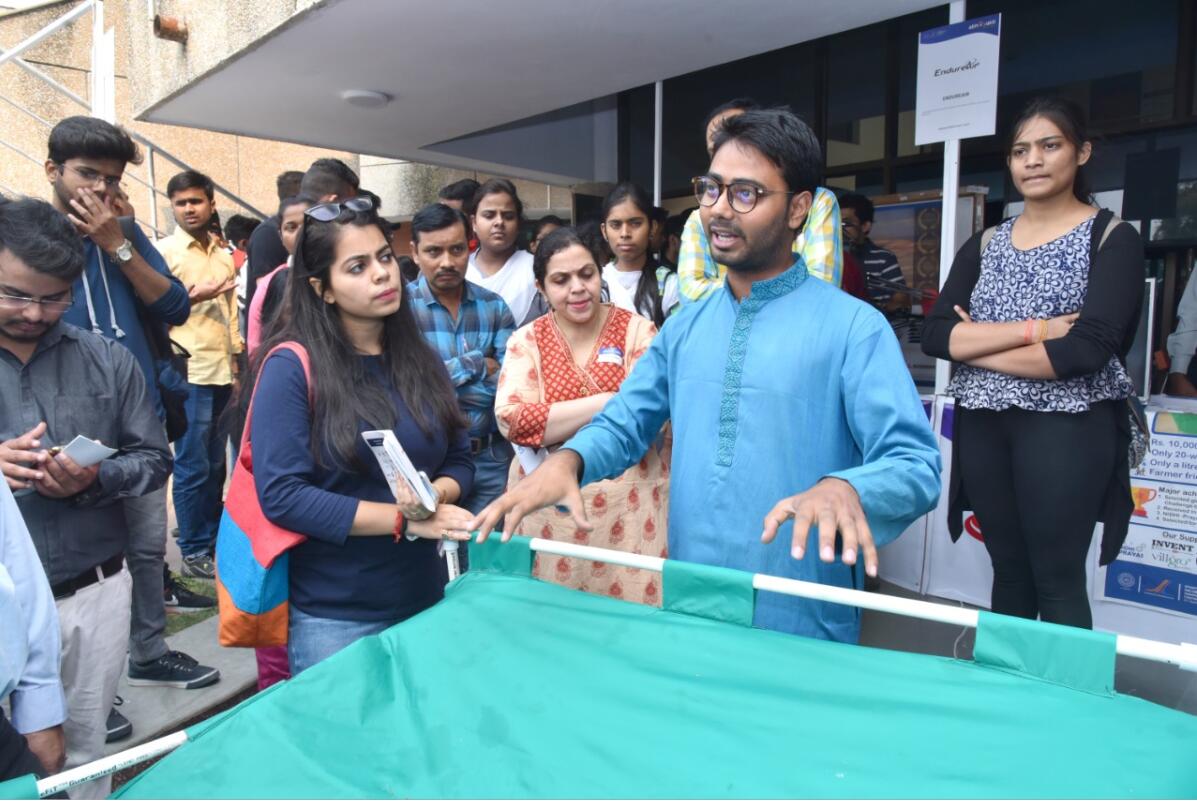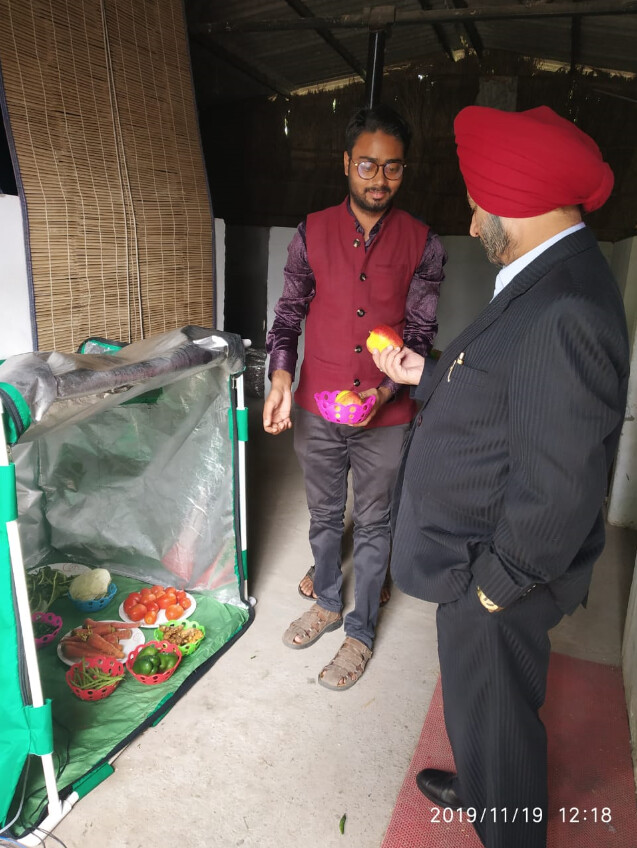Bihar Startup Helps Farmers Keep Veggies Fresh Up To 30 Days Without Refrigeration
Saptkrishi, a startup in Bihar, founded by Nikky Kumar Jha and his younger sister, Rashmi Jha, have devised an IoT technology — the Sabjikothi — which is helping farmers store their produce for longer while also keeping them fresh.

Even though India stands among the largest producers of fruits and vegetables in the world, our per capita availability is low because post-harvest losses account for about 30% of total production. To preserve their shelf-life, these crops require adequate cold storage facilities. These facilities allow farmers to preserve their produce while also giving them the necessary time to sell at the right price. But establishing this sort of infrastructure requires large amounts of capital, electricity and extensive logistics.
Growing up in the village of Naya Tola Dudhela in Bhagalpur district, Bihar, Nikky Kumar Jha remembers how farmers growing horticulture crops would waste nearly a third of their produce because they didn’t have adequate storage facilities and electricity.
As part of his MSc dissertation in Ecology and Environment Studies from Nalanda University, he developed an off-grid cold storage device considering the state of electricity supply in Bihar and the post-harvest wastage he saw all his life, particularly for horticultural produce.
“But there was one flaw in the device. It failed to work during the monsoon season. I was a bit stressed about this and discussed the matter at home. During a family dinner in 2018, my younger sister, Rashmi Jha, a biotechnologist, told me that I was doing the same thing as others by making a device that supplies artificial cooling. Instead, she suggested that I make a device that does the job of preserving fruits and vegetables. That specific point of extending the shelf life of farmer produce without resorting to refrigeration stayed with me. After this conversation, both my sister and I conducted research on the same,” recalls Nikky, speaking to The Better India.
Today, the 25-year-old entrepreneur and his younger sister, Rashmi Jha, operate a startup called Saptkrishi, which has developed a unique storage device to address these shortcomings. Called Sabjikothi, this tent-like structure can reportedly extend the shelf life of fruits and vegetables from 3 to 30 days without resorting to any refrigeration.
All this IoT-enabled storage device requires is 10 watts of electricity either on or off-grid, and a litre of water per day. It saves farmers 30% of their horticultural crops that often goes to waste without an adequate storage facility while also saving them a tremendous amount of electricity since it operates on a small lead-acid battery that generates 10 watts a day. This self-assembled storage device can be transported on everything from a thela (a simple wooden cart) to an e-rickshaw and even a truck. So, how does the Sabjikothi made by this IIT-Kanpur-incubated startup work?

No refrigeration needed
Nikky Jha explains, “Sabjikothi extends the shelf life of perishable horticultural produce through the construction of a high-humid and sterile isolated chamber. This chamber is incorporated with high-end technology that suppresses pathogens as well as the respiration rate of fruits and vegetables, thus inhibiting ethylene biosynthesis which is responsible for perishability. It oxidizes ethylene into small molecules, thus delaying browning and ripening, and also regulating the activity of the antioxidant enzyme. The controlled microclimate created inside the Sabjikothi enables the preservation of fruits and vegetables anywhere between 3 to 30 days. It works on the principle of degradation of ethylene itself, which is responsible for the perishability of fruits and vegetables. Sabjikothi comes with the novel idea to incorporate storage and transportation solutions into one single unit while using ethylene-degradation as the preservation technique.”
But different categories of fruits and vegetables require different microenvironments.
“We have carefully researched the different types of microenvironments required by fruits and vegetables. To address these differences, we have attached a regulator which can change the microenvironment within the storage device, depending on the crops stored. We have even made adjustments for mixed microenvironments, wherein a farmer can deposit a collection of different fruits and vegetables like bananas, apples, cabbages and oranges. But the shelf-life of this produce set may not be as long as if you stored only apples or bananas or tomatoes in isolation. This is because the microenvironment will be set specifically for apples or tomatoes. And there is the IoT-enabled feature as well,” he says.
The Sabjikothi is a tent-like self-assembled structure. There are four stands holding the storage device which comes in three variants. They can store up to 200 kg, 500 kg and 1,000 kg and per unit they cost Rs 10,000, Rs 20,000 and Rs 40,000 respectively.
“For the Rs 10,000 variant, you have that regulator switch. Meanwhile, the other variants are connected to our Saptkrishi app in which you can click on what specific fruit or vegetable you want to store like potato or brinjal, and the entire microclimate inside will be adjusted to the crop you want to store. This is an IoT-enabled system for farmers. We are not only giving farmers better storage options but also enabling them to go digital,” he adds.
Compared to a conventional refrigerator which can store upto 30 to 40 kgs of fresh produce, the Sabjikothi offers 10 times the capacity, 100 times the saving on the electricity required and it only costs half the total amount, observes Nikky. “The best part is that we can even transport it on thela (cart). It only requires 10 watts of power which is equivalent to the amount of power required to run your mobile phone. Our storage device is powered by a small lead-acid battery, although we have plans to switch over to lithium-ion,” he adds.

Addressing a massive gap in the market
There is a massive gap in the horticulture produce market between no storage and cold storage, which means many farmers either have access to the latter or nothing. According to the National Centre for Cold Chain Development (NCCD), there is a shortfall of 126 lakh tonnes of cold storage capacity. But what if there was an alternative to massive cold storage facilities for individual farmers, traders and other players in the supply chain?
Sabjikothi requires no artificial cooling to preserve vegetables and fruits, and this device, Nikky believes, will best assist small and marginal farmers.
“As per data from our surveys, 92% of marginal farmers generate income for their daily household expenses through selling fruits and vegetables. After harvesting them, a farmer takes her produce to the local mandi, which on average lies 14-15 km away. To cover this journey, it would take around a couple of hours. For these few hours, the produce is exposed to a harsh tropical outer environment wherein they lose a lot of water. By the end of two hours, the weight of the produce may fall from 100 kg to anywhere about 96 kg,” notes Nikky.
This loss of income is not accounted for in the supply chain. To make matters worse, prices at the mandi fluctuate through the day. With her produce losing value every hour it’s left exposed to the outer environment, the farmer needs a formal system of storage that can help preserve her produce for a time when she can sell her produce at a fair price.
“Our system ensures no weight loss because we are creating a high humid condition inside. There are no pathogenic attacks inside our storage device and instead, you’ll get sterile food and vegetables. This has health benefits for the end consumer as well because the produce is sterile and prevents the growth of E.coli and other bacteria on the surface of these fruits and vegetables,” says Nikky.
Besides reducing post-harvest wastage by more than 30%, he also claims that even the smallest 200 kg variant of the Sabjikothi can help avoid up to 1,876 kg of CO2 emissions every year, which is equivalent to cultivating 60 trees. “If the 30% gets wasted, it will generate methane which enters the atmosphere and eventually combines with oxygen to form more CO2. Compared to refrigerators or other cold storage devices, you’ll also be saving a tremendous amount of electricity. That’s a significant impact,” he claims.
Validated and tested extensively by the Arunachal Pradesh government, Saptkrishi is successfully running pilot trials in Bihar with support from the Bill and Melinda Gates Foundation. Support for the Foundation also came from the AGNIi Mission, a flagship initiative under the Office of the Principal Scientific Adviser, and one of nine technology Missions under the Prime Minister’s Science, Technology and Innovation Advisory Council (PM-STIAC). AGNIi connected the founders to appropriate partners who could assist with funding and expertise.
Models of the Sabjikothi have been installed at IIT-Kanpur as well, where professors are examining a specific number of days it can preserve individual fruits and vegetables. “We are claiming 3 to 30 days of extended shelf life, but soon we will come out with a specific number of days of different major fruits and vegetables,” he adds.

Business model
At present Saptkrishi is selling units of Sabjikothis in clusters of 10. Since they are a young startup, which was incorporated in March 2019, and not flush with revenue, they want to reduce the cost of maintenance of their electrical and mechanical components.
“Instead of sending out our engineers to fix one Sabjikothi unit in a distant corner of this country, we are looking to send him or her to a place where there is a cluster of 10 units that require fixing, maintenance or servicing. Thus, we are currently not selling this to individual farmers. Once we firmly establish our business on the ground after selling to many clusters, we will transition to selling to individual farmers. We are manufacturing the Sabjikothis in Bhagalpur, Bihar, while we are also receiving technical support from IIT-Patna and Sher-e-Kashmir University of Agricultural Sciences and Technology in Jammu,” he says.
Additionally, Saptkrishi is seeking to eliminate mandi intermediaries to some extent by empowering microentrepreneurs and other small businesses to purchase the produce from farmers digitally through the Saptkrishi app at a fair price and then selling directly to consumers. At present, the Bihar-based startup is creating a chain of microentrepreneurs in cities like Bhagalpur, Patna and Kanpur.
One such microentrepreneur is Saurabh Tiwari, the owner of a small vegetable delivery service called Sabjiwala based out of Bhagalpur.
“Earlier, I would buy vegetables from the mandi, transport them to the residential areas and complexes, and sell. During the lockdown I met Nikky, who told me about Sabjikothi and convinced me of its benefits. I initially took up his offer on a trial basis. Since Sabjikothi offers a portable micro-system to transport vegetables, it allowed us to bypass the mandis and source the vegetables directly from small farmers. By using Sabjikothi to store and carry the product, we ensure that the vegetables don’t get spoiled, and at the same time, we are able to facilitate better incomes for small farmers,” says Saurabh.
Besides, he is using the Saptkrishi app to connect directly with his customers. Thanks to this association, his business has picked up steam.
“Sabjikothi has immense potential to support agri micro-entrepreneurs. Since using their services, I have expanded my business, doubled my revenues and increased profits. We have also expanded our team from two people to 10 employees,” Saurabh says.
(Edited by Yoshita Rao)
Like this story? Or have something to share? Write to us: [email protected], or connect with us on Facebook and Twitter.
If you found our stories insightful, informative, or even just enjoyable, we invite you to consider making a voluntary payment to support the work we do at The Better India. Your contribution helps us continue producing quality content that educates, inspires, and drives positive change.
Choose one of the payment options below for your contribution-
By paying for the stories you value, you directly contribute to sustaining our efforts focused on making a difference in the world. Together, let’s ensure that impactful stories continue to be told and shared, enriching lives and communities alike.
Thank you for your support. Here are some frequently asked questions you might find helpful to know why you are contributing?


This story made me
-
97
-
121
-
89
-
167













